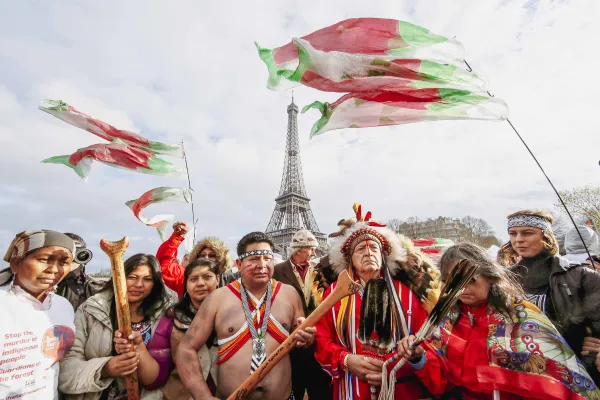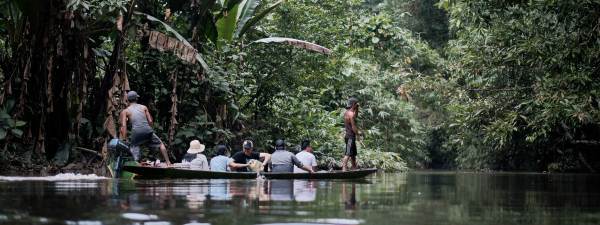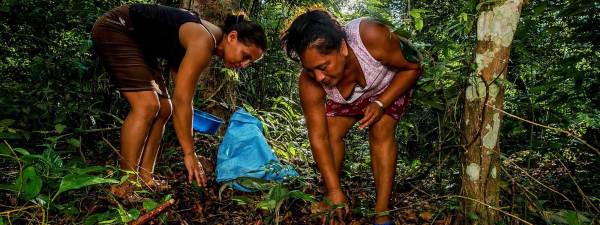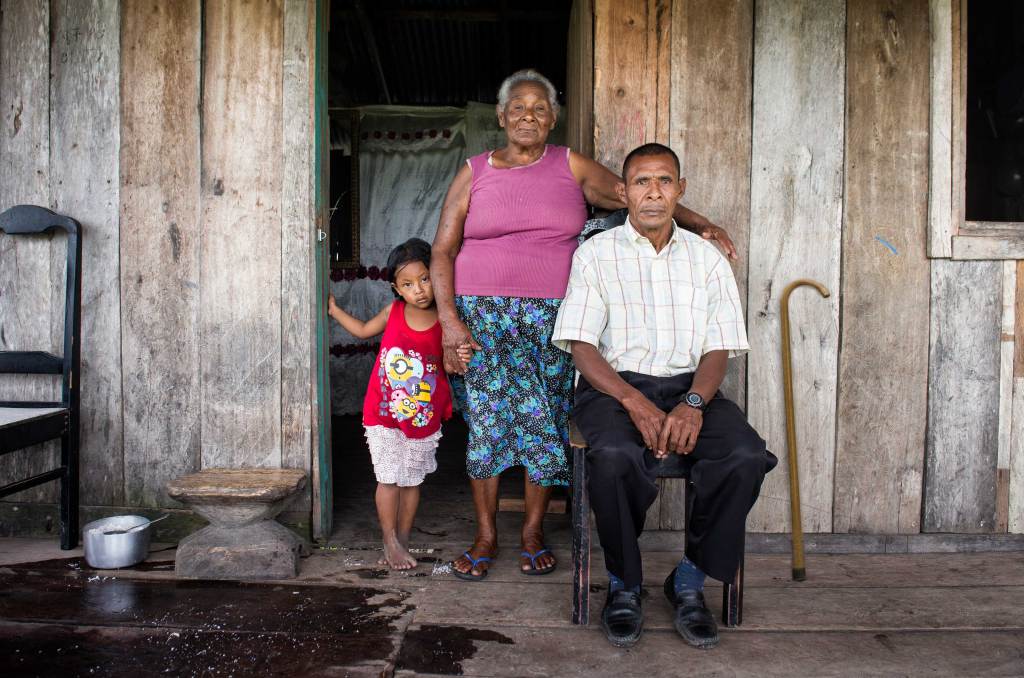
What people with disabilities have to teach us about climate change
Prisca Mathew awoke in her concrete-block home in the Nigerian village of Ebocha and stepped out into bright daylight. The clock read 3 a.m. A 30-year-old mother of three, Prisca lives less than 30 yards from two methane gas flares operated by one of the petrochemical companies that dominate life here in the Niger Delta.
In the half-century since the industry arrived in the region, such projects have reaped billions of dollars in profits. The oil and gas sector is responsible for 86 percent of Nigeria’s foreign exchange earnings. But the Delta’s labyrinth of tidal creeks and inlets is now contaminated with oil, the bright flares spewing toxic pollutants into the sky 24 hours a day.
“The rain comes as black liquid,” Prisca said. “We don’t drink the water any longer, and we don’t use it for bathing because it causes skin irritation.”
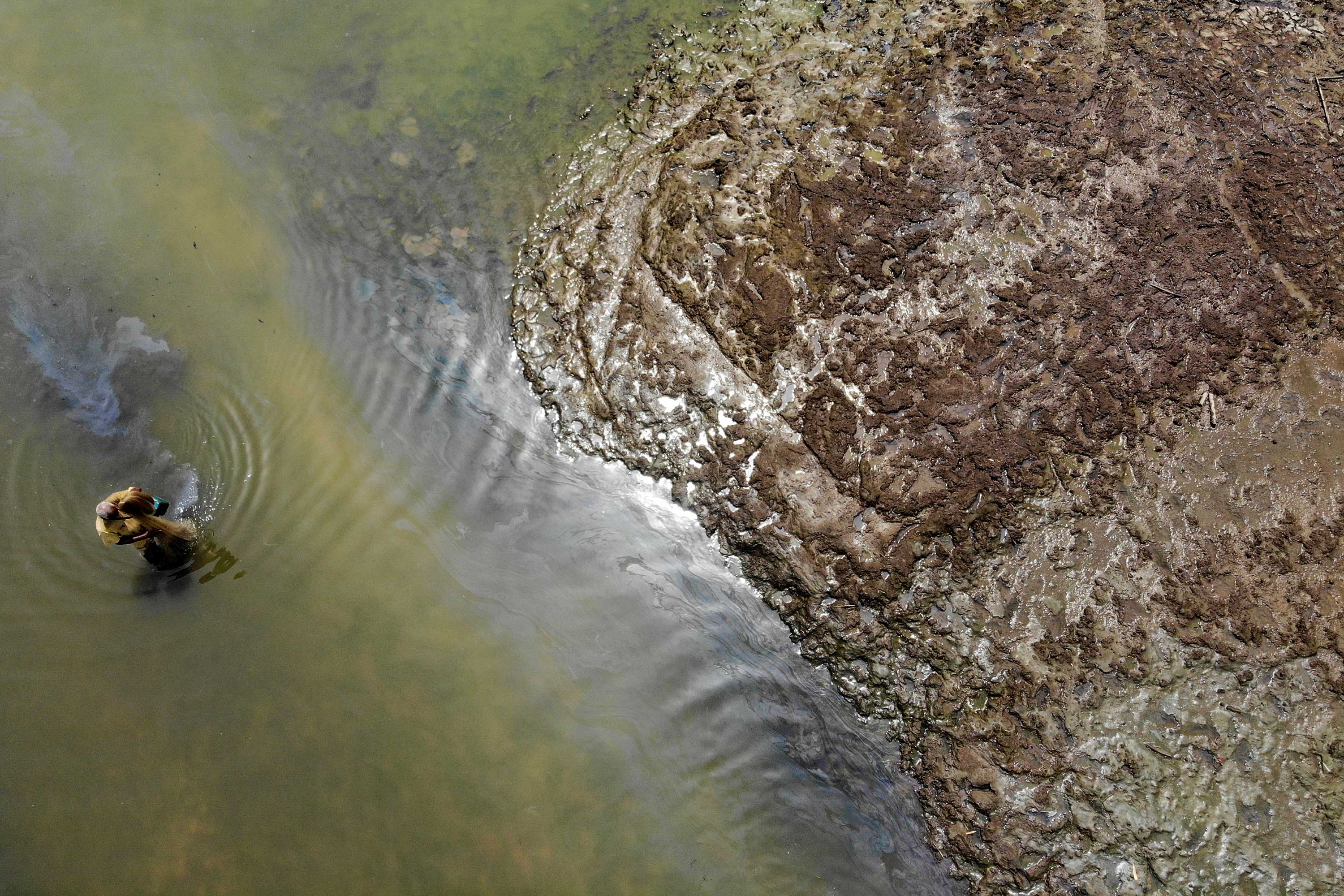
Many of the children in Ebocha have ear injuries, a result of the roaring flames. “Some nights, the noise makes the ground tremble,” she said. “Everyone’s eyes burn from the fumes, and some have gone blind.” Prisca can rattle off the names of friends who suffer from skin diseases, asthma, and chronic coughs. Others have dealt with lung and neurological conditions and died from cancers of one sort or another. Petroleum spills compromise their crops and kill off the fish, and the malnutrition that results leaves their children susceptible to various forms of disability. “The conditions worsen every year,” said Prisca’s husband, Chineda Mathew. “Someone who is 40 years of age can look as old as 90.” In fact, life expectancy in the oil fields is a dismal 41 years. And now with climate change, Prisca said, daily existence is only getting harder. “This year the rain didn’t fall as expected in July, but towards August and September, they are falling heavily. Sometimes they submerge the farms.”
Here in the Delta, issues of environmental justice have long been intertwined with those involving disability. But such connections haven’t always been so clear.
People with disabilities represent 15 percent of the world’s population and, as climate change and other environmental issues become an ever-more-present fact of our daily lives, these communities are disproportionately feeling the impacts. As in the Delta, floods devastate crops across the globe, compromising food security and leading to chronic malnutrition. Prolonged drought decreases access to clean water and sanitation, heightening vulnerability to disease. Others acquire disabilities as a result of the exploitation of natural resources and industrial development that pollutes the air and water. Flash flooding displaces villages, but no forethought has been given to the effects on people with disabilities in the community.
A journey to inclusion
In 2015, we at the Ford Foundation embarked on an organization-wide effort to focus on disability, aiming to, among other goals, integrate a disability lens across our programs, including my own area of Natural Resources and Climate Change. One of the first steps I took was to reach out to Peter Kostishack, director of programs at Global Greengrants Fund, based in Boulder, Colorado. Ford has funded and collaborated with Greengrants since 2003, so I knew that the organization, which works with communities seeking solutions to environmental harm and social injustice, approached challenges in a holistic way. Did he see an opportunity here?
Kostishack wasn’t immediately sure. He consulted Greengrants’ network of advisors, a group of roughly 200 indigenous and grassroots leaders and advocates scattered across the globe, and asked if they had seen examples of this overlap in their work. Many said yes. Others admitted that they hadn’t much thought about it, invariably adding, “We should do something about this!” The enthusiasm sent Ford and Global Greengrants on a learning journey together.
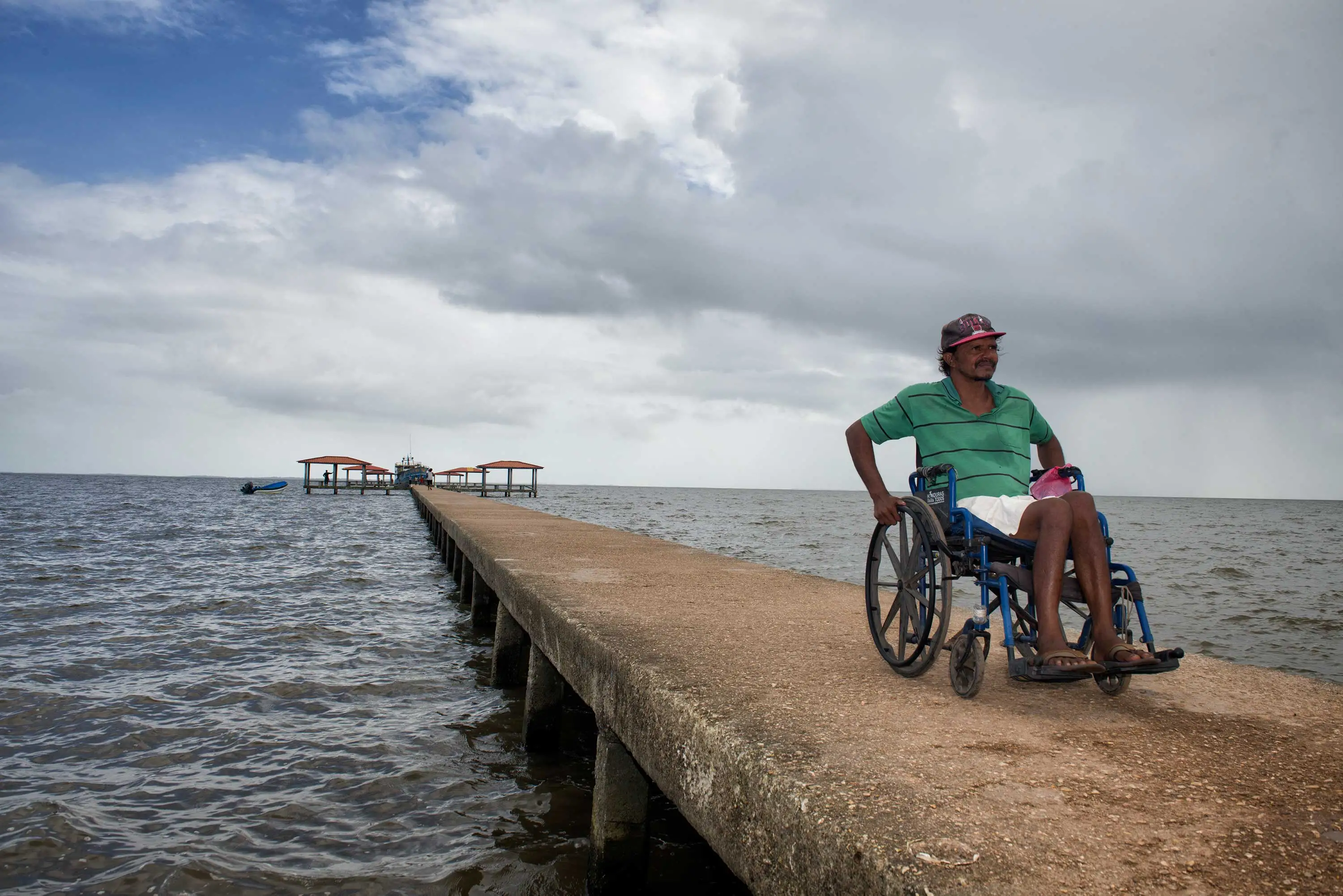
While Kostishack and his network understood the potential for impact, they recognized their relative ignorance on the subject. With Ford’s support to explore these intersections and guidance from Greengrants’ global advisors, the fund was able to deepen its understanding of the issues and begin forging alliances between organizations focused on people with disabilities and those advocating for environmental justice. We knew it was likely to take some time, but we were all eager to get things right from the beginning.
A small team of consultants helped the Greengrants team to think through the evolving definition of disability rights and how such issues might arise in the context of environmental justice. Yolanda Muñoz, a professor at McGill University and a renowned advisor on indigenous people’s rights and disability rights, told the story of how, after sustaining an injury that left her physically impaired in her twenties, she’d been forced to confront her own “ableism,” or discrimination against people with disabilities. “I had my own ideas—my wrong ideas—about what it means to have a disability,” she said. “It’s so rooted in our culture that being disabled is bad, it’s tragic, it’s sad. This is what we’ve all learned.”
In many places, Kostishack and his team would discover, this sort of stigma means that such voices never get heard. Muñoz recalled arriving in a remote village in her native Mexico in a wheelchair and being approached by a local man. “I have a nephew who can’t walk,” he told her, “but he never leaves home. Would you like to come see him?” Muñoz emerged from that house and watched as villagers began sheepishly appearing in their doorways. “Suddenly there were 30 people in that very small community, in the middle of nowhere, in the middle of a mountain range,” she said. “These were people who never left their homes. The communities think that people with disabilities should not be consulted. But we have a lot to say.”
Connecting movements
With Global Greengrants’ support, many are now finding their voices. Among them are a group of indigenous Miskito men living on the Atlantic coast of Honduras. When Victor Lopez, my colleague based in Ford’s Mexico and Central America office, visited the region, he noticed a surprising number of men sitting outside of their homes in wheelchairs. Lopez eventually learned that they were divers, hired by multinational fishing companies to bring in lobsters and other seafood from the deep. But climate change and overfishing have so depleted the waters there that the men now must dive to increasingly dangerous depths without the proper equipment. As a result, thousands of these fishermen suffer from some degree of decompression syndrome, a disorder resulting from the drop in pressure that occurs in the body when divers surface from the deep.
Though the condition can be treated with the use of a hyperbaric oxygen chamber, the remote, impoverished region lacks access to even the most remedial medical facilities. Spinal cord injuries as a result of the syndrome have left thousands here with permanent neurologic problems, including paralysis and incontinence.
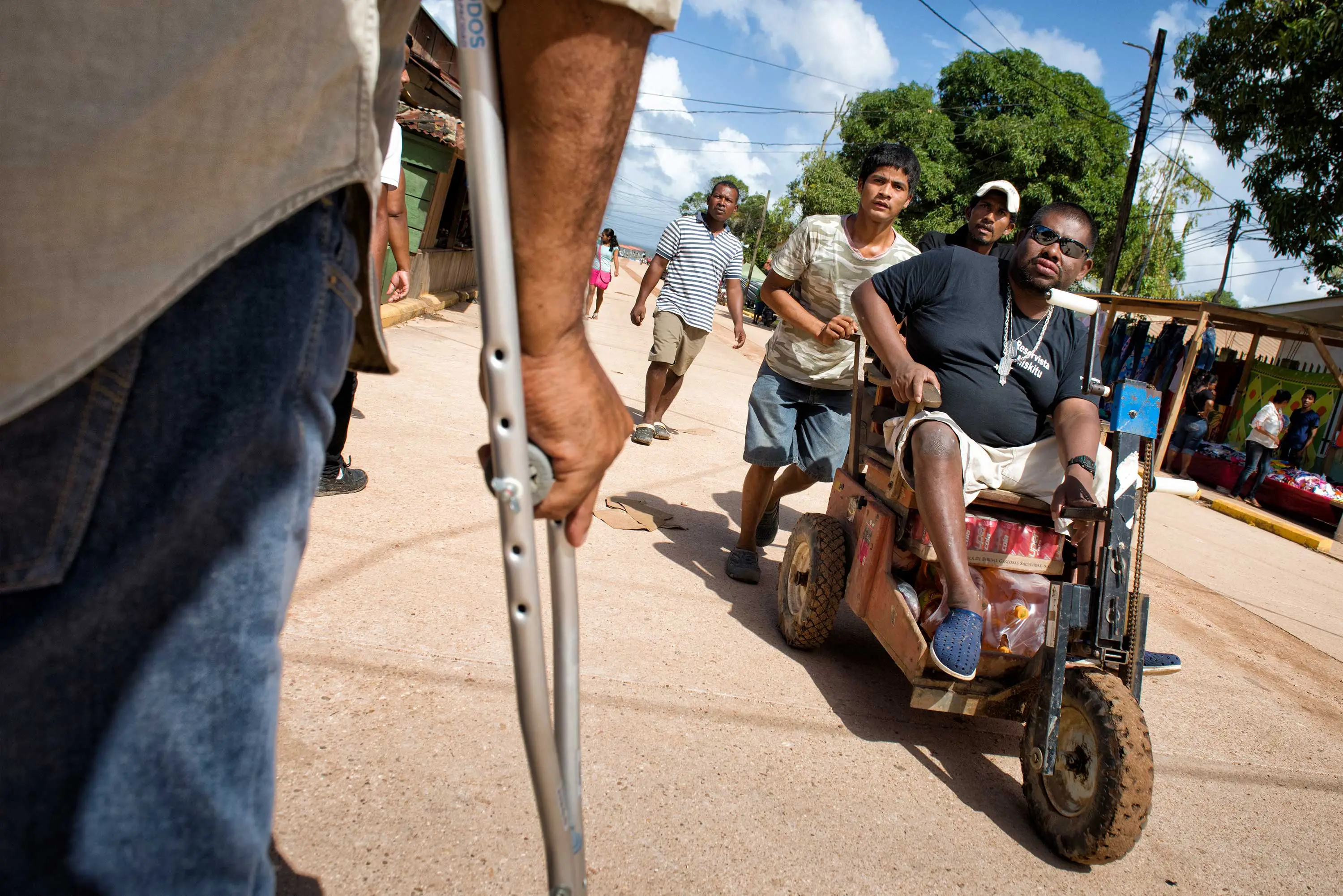
Global Greengrants had been supporting the Asociación de Mujeres de la Isla de Tansin, or TAKIMAS, a local women’s organization focused on gender issues and sustainable livelihoods, but it increased its support when the women turned their attention to the divers with disabilities and their families, enlisting them to help with farming projects, reforestation efforts, and the overall conservation of the region’s unique lagoon ecosystem. A 54-year-old diver named Kemsly Rito Greham told me that working with TAKIMAS has been instrumental in helping him to once again see himself as a human being—as somebody with rights and an identity rather than simply a victim unable to support his family.
In the case of the Niger Delta, a disability rights group expanded its work to include a focus on the environment. Nnimmo Bassey, a prominent human rights advocate and a co-chair of Greengrants’ board of directors, recommended that Greengrants back a group called Persons with Disabilities Action Network, or PEDANET, which for 15 years has promoted the rights, health, and social well-being of Nigerians with disabilities. He appreciated that PEDANET’s charismatic founder, Emeka Betram, who had polio as a child, views the work of social justice from a broad perspective. PEDANET works to educate Nigerian society across different levels, raising awareness among people with disabilities themselves and then holding rallies, media roundtables, and other events to ensure that the communities’ needs are addressed by civil society and policymakers from the local to the national level.
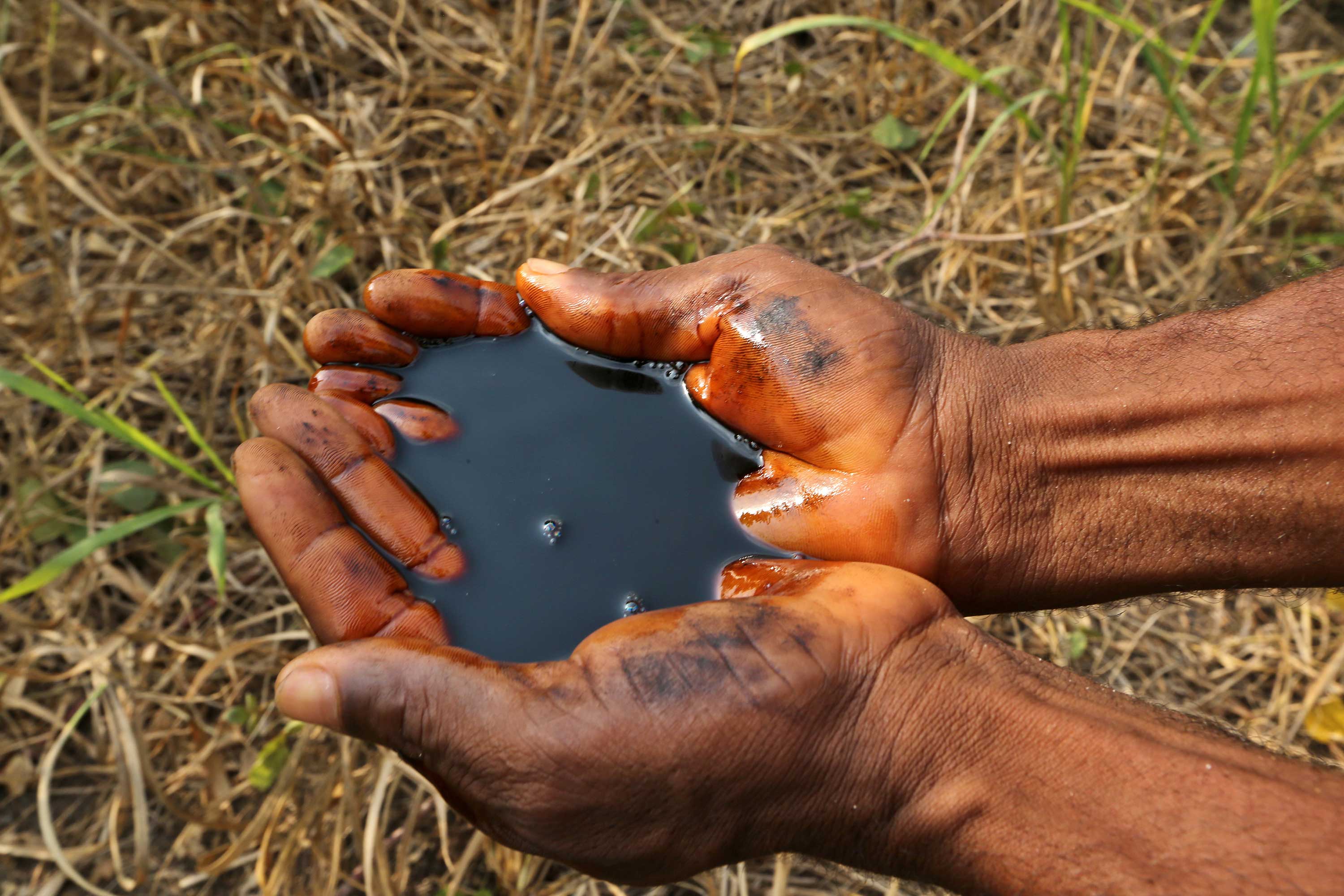
Just as Betram intends to ensure that people with disabilities inhabiting Prisca and Mathew’s watery Delta are heard in the face of oil spills and flooding, so is a Greengrants grantee in Nepal focused on helping indigenous people with disabilities living in the shadow of a hydropower plant. The residents were never consulted prior to the project’s implementation, but the National Indigenous Disabled Women Association of Nepal has been carefully documenting the profound social, environmental, and economic impacts that it’s had on people with disabilities, particularly women and youth. Plugged into a powerful international network of activists, the association’s founder, Pratima Gurung, is using her funding to hold community-level consultations highlighting the intersections of climate change, gender, and disability and compiling data that she can then take to the government to gain support for these vulnerable groups.
Due to high levels of poverty, increased exposure to environmental degradation, and a heightened risk of violent victimization, indigenous communities experience inordinately high rates of disability. These groups are the best guardians of their forests and territories, yet they continue to be left out of decisions about natural resources that affect their lives. Their voices have not generally been included when it comes to policies around climate change and mitigation. “This is one of the trends we’ve seen come out in these first couple of years,” Kostishack said, “the inextricable links between disability, environmental degradation, and poverty.”
It’s for this reason that so much of Global Greengrants’ work incorporates a focus on economic development. He and his team recognize the importance—particularly among indigenous groups that have deep spiritual and cultural connections to the land—of fostering alternatives for sustainable livelihoods to communities. “We’re an environmental justice organization,” Kostishack explained, “but often those alternatives are really critical for communities if they want to define their own path rather apart from the extractives industries.”
Samuel Ndobe, for example, who coordinates Greengrants’ Central Africa advisory board, recommended a group facilitating the reintegration of people with disabilities into the economy of a Cameroonian village affected by deforestation and an exodus driven by climate change. Those left behind are mostly teenage mothers, the elderly, and people with disabilities, and the area’s prolonged drought requires them to walk long distances to collect water and wood for fuel. “Everyone who talks about disability talks about access, but nobody is talking about the link with the environment,” said Ndobe, who was one of the advisors most enthusiastic about exploring the nexus. Greengrants funds are helping to provide these communities with alternatives to support themselves, including the establishment of a fish pond that supplies the community with protein and a source of income.
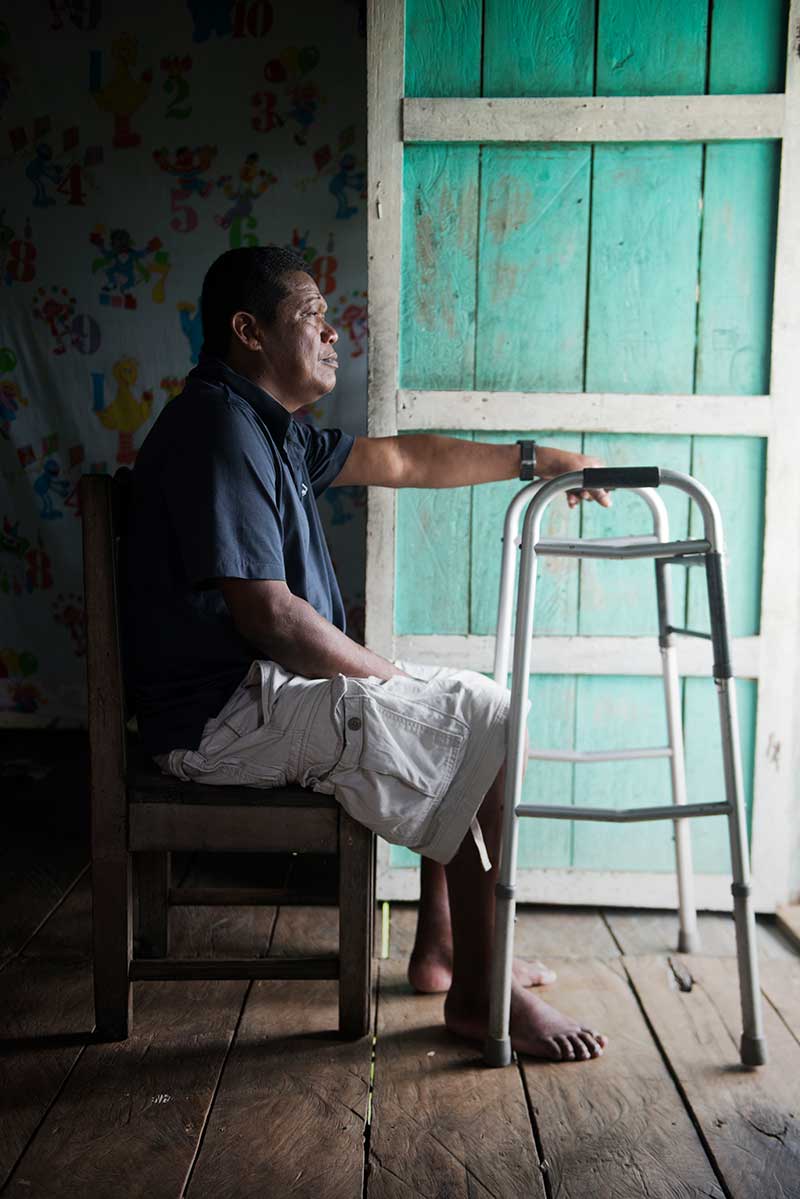
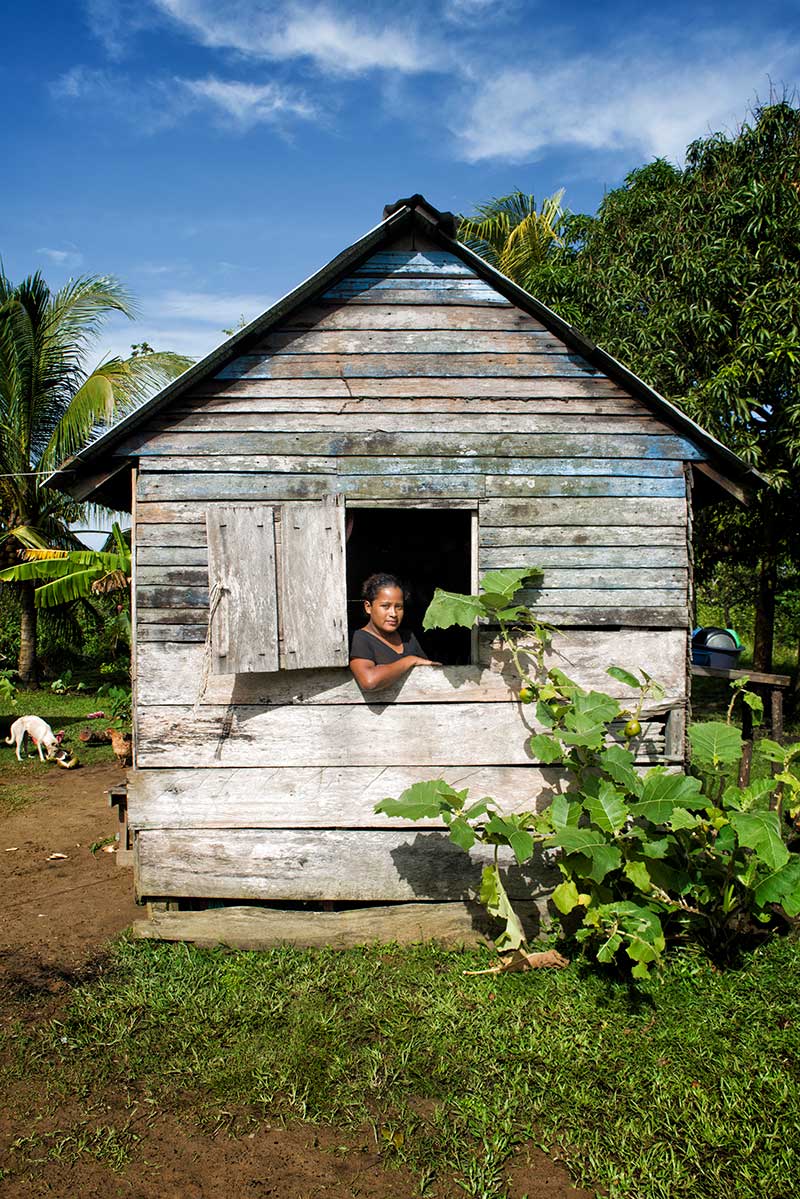
Self-sufficiency—and the dignity that comes with it—sit at the heart of the work of a young Filipino activist named Heartcell Paborada. Born with a disability, the 28-year-old speaks passionately about the cultural factors at play in her indigenous Higaonon community and how she’s striving to shift them. People in the region have long associated physical and mental disabilities with bad karma, Paborada explained, and the families of children born with such conditions, believing they’re being punished for some reason, have traditionally hidden their young ones away.
These days, Paborada said, smiling broadly, kids with disabilities attend school and the older ones are emerging as important voices in society. Thanks to the Indigenous Peoples Rights Act, passed in the Philippines in 1997, Paborada’s community has secured the rights to its land, but oil palm plantations and mines already occupy part of it. Paborada and her colleagues have been using Greengrants’ funds to educate the community about how groups, like women, youth and people with disabilities, can play important roles when it comes to protecting the land. Shifting community norms that traditionally value physical labor, the group has demonstrated the importance of contributions such as sowing seeds in polybags. “The planting of just one tree has benefits for everyone, so now they are recognized by the entire community.”
New leaders, new perspectives
Among the most rewarding aspects of this work has been the way that it has broadened our own perspectives and opened our eyes to new realms of possibility. I’m often reminded of a young man I knew while living in Peru in the mid-2000s. A soft-spoken guy who tended to fade into the background, he was shot while protesting against a large-scale mining project encroaching on the lakes his community relied on for water. In the years after the incident, my once-shy friend, now in a wheelchair, emerged as a powerful voice for the rights of the people with disabilities, eventually becoming a national leader. There’s no question that his place in the public eye pushed all Peruvians to reconsider their notions about disability and the contributions that the people with disabilities among us can make to society.
Today, Greengrants has made 44 grants in partnership with Ford, totaling over $205,000. Kostishak and his team also have begun supporting projects at the intersection of environmental justice and disability beyond the funding provided by Ford, suggesting that the organization’s perspective on this nexus continues to expand.
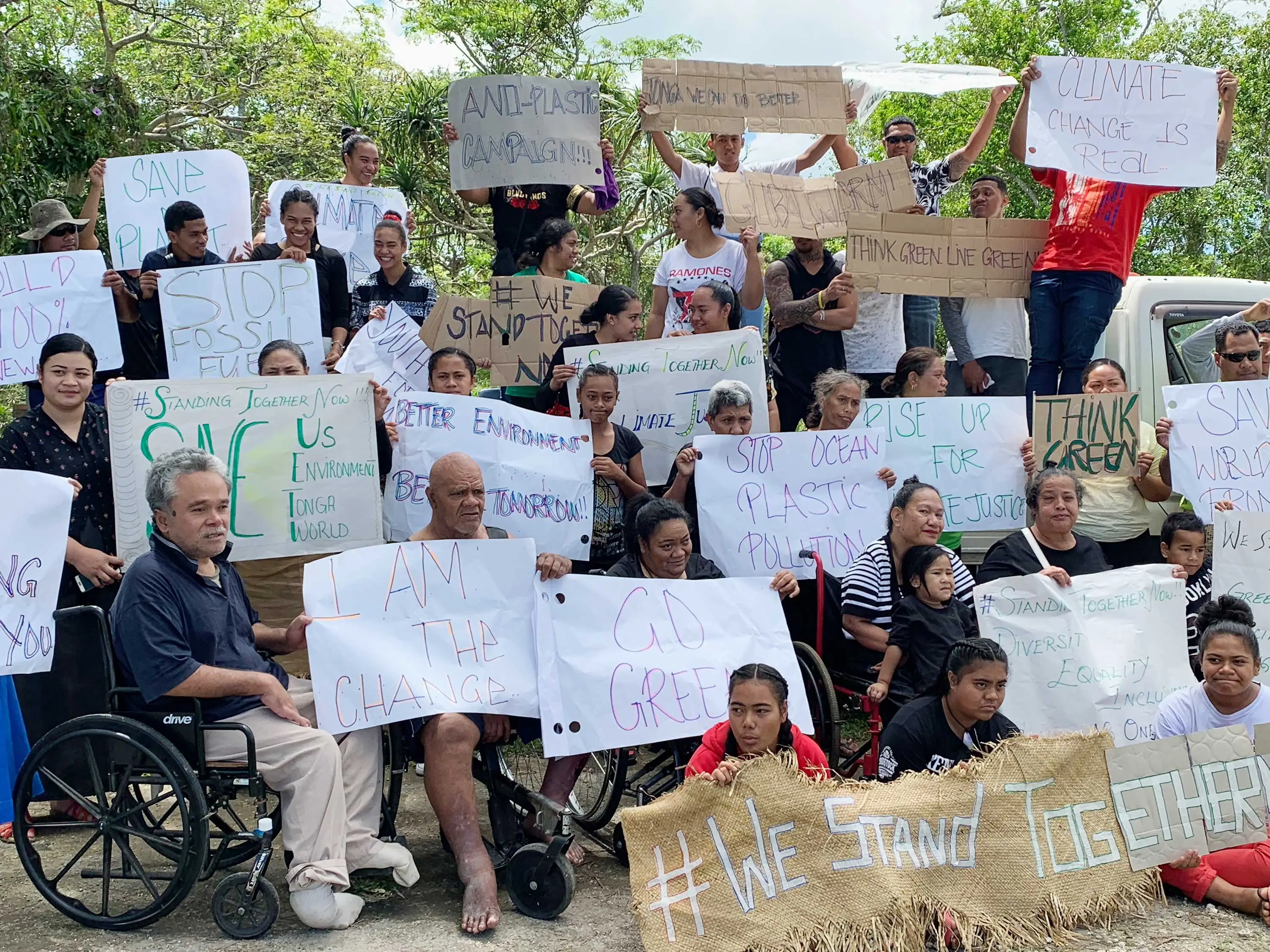
“It’s taken some time to have these conversations,” Kostishack said, “how disability is seen locally, where there’s energy and desire to increase inclusion. It takes these innovative leaders from within these territories to stand up and say, ‘Yes, I want to carry this forward.’ It can’t be pushed from the outside.”
We at the Ford Foundation hope our efforts highlighting this important intersection will spark more philanthropy that places people with disabilities as voices of agency and power in the environmental-justice movement. The community has a unique role to play in offering innovative solutions. “When you acquire a disability,” Muñoz told us at the beginning of this journey, “you have to be super resourceful and creative to solve problems that nobody else has.”
When it comes to resilience, and to adapting to the challenges that climate change will undoubtedly throw our way, it is just these sorts of out-of-the-box thinkers who should lead the way.

